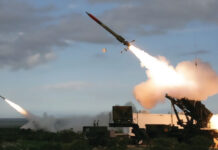Kenya’s sudden spiral into chaos after years being regarded as a regional stability in the turbulent Black African continent, will no doubt strike a heavy blow on the economies of a wide swathe of neighboring nations. But while the present scale of internecine violence came as quite a surprise, it was not the first time that this African nation became engulfed in chaos.
From October 1952 to December 1957 Kenya was under a state of emergency arising from the so-called “Mau Mau” rebellion against British colonial rule, over the deprivation of the Kikuyu majority. The official number of Kenyans killed was estimated at 11,503. Much fighting among the various tribes followed, until independence from Great Britain in December 1963, when Jomo Kenyatta, also a Kikuyu became first prime minister of the autonomous Kenyan government. Over the last decade or so, Kenya was regarded an African success story. Beginning to enjoy the fruits of its stability and openness, its economy has grown by more than 6 per cent annually in recent years.  But now, in just a few bloody days, since a disputed election on December 27, Kenya has quickly slipped from democratic hopeful, escalating into uncontrollable chaos and brutal murder. From years of prosperity, it threatened to become the scene of just another regional, highly dangerous trouble spot, torn by ethnic bloodletting and prone to outside terrorist intervention.
But now, in just a few bloody days, since a disputed election on December 27, Kenya has quickly slipped from democratic hopeful, escalating into uncontrollable chaos and brutal murder. From years of prosperity, it threatened to become the scene of just another regional, highly dangerous trouble spot, torn by ethnic bloodletting and prone to outside terrorist intervention.
Back in 2002, Mwai Kibaki (age 76), a Kikuyu, was elected as president, promising to clean up Kenya after 40 years of corruption. His election was widely praised, after previous polls were marred by irregularities and ethnic violence between the Kikuyu and Luo communities. But now it seemed that Mr Kibaki was determined to hang on to power by those very corrupt means which he has declared fighting.
Many of the voters actually favored Raila Odinga (62), who is a Luo, a tribe from western Kenya near Lake Victoria on the border with Uganda, comprising about 22 per cent of the population. The present turmoil has already caused dangerous repercussions throughout Africa. Kenya’s port of Mombasa and the single road snaking up to Uganda and beyond are vital for the economies of the entire region and the impact of the ongoing crisis is being felt with petrol pumps already running dry in Uganda and Burundi and with rationing being imposed in Rwanda. Any weakening of democracy in Kenya will have a domino effect across the continent, threatening infiltration of Islamic fundamentalist elements into any unstable state.
The country, famous for its palm-fringed beaches and wildlife parks, visited by millions of tourists, shares borders with Tanzania, Uganda, Sudan, Ethiopia and Somalia. While its 36 million people are split into more than 40 ethnic groups, Kenya was nevertheless sofar widely regarded as a haven of relative peace and prosperity in a region plagued by conflict, poverty and disease. All this might now change rapidly, if a solution cannot be found immediately to prevent total disaster. By inviting dangerous elements like Al Qaeda or it’s affiliates into the void, these could make their comeback into this little ‘Garden of Eden’. In fact, Kenya’s attorney general Amos S. Wako has warned that his country is “fast degenerating into a catastrophe of unimaginable proportions”. About a third of Kenya’s population are Muslims, many more are refugees, driven by the unrest in neighboring Somalia, creating further problems of the already largely deprived Muslim population in the country.
The fact is that many corrupt African governments, porous borders, widespread poverty and discontented Muslim populations have created a region ripe for Islamic fundamentalism, Kenya, and Tanzania just to its south, have already been victims of al-Qaeda terrorism. Kenya itself borders with the highly volatile and Al Qaeda infected Somalia. Moreover, as Al Qaeda is currently coming under pressure in Asia, any lawless African nation must now be considered their obvious target.
Already in 2005 such warning came from Major General Douglas Lute, then director of operations at US Central Command “There will come a time when Zarqawi will face too much resistance in Iraq and will move on,” the general predicted, referring to the head of Al-Qaeda in Iraq. (Abu Musab al-Zarqawi, the Jordanian-born Islamist who was later killed in an American airstrike). Al-Qaeda has spent years operating in Kenya and is widely remembered by the 1998 twin bombing of the U.S. Embassy in Nairobi and in neighboring Tanzania, that killed 224 Kenyans, Tanzanians and Americans and injured over 4,000 more. This bloody attack was followed shortly by a 2002 suicide car bombing targeting a hotel popular with Israelis near Mombassa and the attempted destruction of an Israeli airliner by shoulder fired missiles, from near its airport. It had awakened U.S. security officials to the dangers posed by militant Islam in East Africa. In the years since, the Horn of Africa, and Kenya in particular, has come into new focus of U.S. counterterrorism.
 What is little known was that a radical Palestinian group was already implicated in the bombing of the Jewish owned Norfolk Hotel in Nairobi on New year’s eve in1981. It was then, that Kenya had already been considered as a soft target by international terrorism experts, but little attention was given. A prime target of U.S. counterterrorism forces in the region for nearly a decade was one Fazul Abdullah Mohammed, who was indicted for planning the 1998 embassy bombings, the Paradise Hotel in Kikambala near Mombasa and the attempt on the Israeli Arkia airliner in 2002. Early 2004, the Kenya Anti-Terrorist Police, trained and financed by the United States, were raiding mosques on a tip-off, detaining suspected terrorists all along the Swahili coast. However Fazul Abdullah Mohammed, warned in time, escaped to Somalia, where radical Islam was establishing its strongest beachhead in the Horn of Africa.
What is little known was that a radical Palestinian group was already implicated in the bombing of the Jewish owned Norfolk Hotel in Nairobi on New year’s eve in1981. It was then, that Kenya had already been considered as a soft target by international terrorism experts, but little attention was given. A prime target of U.S. counterterrorism forces in the region for nearly a decade was one Fazul Abdullah Mohammed, who was indicted for planning the 1998 embassy bombings, the Paradise Hotel in Kikambala near Mombasa and the attempt on the Israeli Arkia airliner in 2002. Early 2004, the Kenya Anti-Terrorist Police, trained and financed by the United States, were raiding mosques on a tip-off, detaining suspected terrorists all along the Swahili coast. However Fazul Abdullah Mohammed, warned in time, escaped to Somalia, where radical Islam was establishing its strongest beachhead in the Horn of Africa.
But Al-Qaeda operatives had already settled themselves into several communities along Kenya’s Indian Ocean coast. In 2004, US Marine Brigadier General Martin Robeson, then commander of the regional US-led anti-terror task force based in neigboring Djibouti warned that hundreds of new Al-Qaeda members had been recruited in Kenya, despite stepped-up anti-terrorism efforts. American intelligence officials mentioned repeatedly, that apprehended suspects included members of Al Qaeda and Al Itihaad al Islamiya, considered the most powerful radical band in the Horn of Africa, which has been funded by Al Qaeda. Counter terrorist intelligence reports have identified the Dabaab refugee camp on the Somalia-Kenya border as a training ground for Islamic extremists, through a Muslim charity, called al Haramain, that sponsored religious schools and social programs in that area.
Kenya long maintained informal military alliances with the United States and the United Kingdom (UK). Since 1980 Kenya has supported U.S. military commitments in the Indian Ocean by permitting use of Mombasa port and air base facilities, in exchange for U.S. military assistance. Kenya is a valuable point of entry and staging platform, for U.S., British, and German aerial and naval search operations targeting Al-Qaeda–linked Somalia-based groups. Currently, Kenyan and U.S. officials are discussing a new U.S. military command, Africa Command (AFRICOM), destined to control U.S. military operations in Africa. Announced in 2007, AFRICOM will be carved out of the three combatant commands responsible for the continent: European Command, Central Command, and Pacific Command. AFRICOM will initially operate from Germany at the European Command headquarters and become fully established in late 2008 somewhere in Africa. Kenya is among the 10 countries being considered for AFRICOM’s main base. But this may well change under the present circumstances, as anti-US sentiments could increase with the ongoing instability. In fact, extending military relations with the US could be foreboding premonition for an escalating anti-American violence Al-Qaeda style, which would only increase regional instability and especially in an inter-ethnic fighting Kenya.
As for Kenya’s own efforts to fight terrorism – these have been sporadic and sofar insufficiently effective to stem any serious influx of subversive elements, as the present chaos clearly demonstrated. In 2004 The Kenyan government had established the African continent’s first counter-terrorism center to help develop and coordinate strategies in east Africa. The new National Counter-Terrorism Center was headquartered in Nairobi, but it seemed sofar totally incapable to overcome the bureaucratic hurdles, obstructing any successful operational function.

















